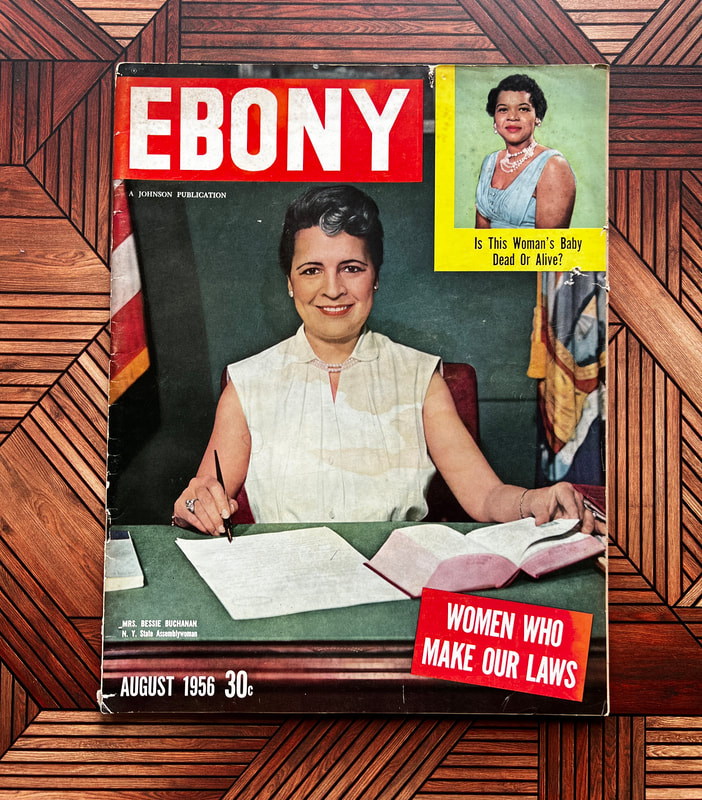CR377
EBONY Magazine
August 1956
Women who Make our Laws Bessie Buchanan
Bessie Buchanan
Bessie Allison Buchanan (March 7, 1902 – September 7, 1980), of Manhattan in New York City, became the first African-American woman to hold a seat in the New York State Legislature when she was elected to the New York State Assembly in 1954.
Buchanan enjoyed a 15-year theatrical career, starring in the musical “Shuffle Along” and dancing in the Cotton Club’s chorus line. Bessie Allison met Charlie Buchanan, who was the director of the Savoy Ballroom, while she was working as a dancer and singer in Harlem.They were married in 1929 and she retired from the stage.
After her marriage, Bessie was active in Woman's Civic Club activities in Harlem. She frequented the popular night clubs. Jet magazine and other publication wrote about her social comings and goings. Educator Dr. Mary McLeod Bethune asked her to work on the 1949 U.S. Senate campaign of Governor Herbert H. Lehman. The experience spurred her political activism. In 1954 she was approached about running as the Democratic Party candidate for the New York State Assembly from Harlem's 12th district. In the general election, Buchanan won easily over her opponent Lucille Pickett, another black woman, 22,401 to 6,177 votes in a district heavily dominated by Democrats. Buchanan was reelected three more times and served a total of eight years.
In the Assembly Buchanan introduced more than 150 bills, many focusing on civil rights and improving public education and neighborhoods. Later, Buchanan served as the State’s Human Rights Commissioner under Governor Nelson Rockefeller.
Bessie Allison Buchanan (March 7, 1902 – September 7, 1980), of Manhattan in New York City, became the first African-American woman to hold a seat in the New York State Legislature when she was elected to the New York State Assembly in 1954.
Buchanan enjoyed a 15-year theatrical career, starring in the musical “Shuffle Along” and dancing in the Cotton Club’s chorus line. Bessie Allison met Charlie Buchanan, who was the director of the Savoy Ballroom, while she was working as a dancer and singer in Harlem.They were married in 1929 and she retired from the stage.
After her marriage, Bessie was active in Woman's Civic Club activities in Harlem. She frequented the popular night clubs. Jet magazine and other publication wrote about her social comings and goings. Educator Dr. Mary McLeod Bethune asked her to work on the 1949 U.S. Senate campaign of Governor Herbert H. Lehman. The experience spurred her political activism. In 1954 she was approached about running as the Democratic Party candidate for the New York State Assembly from Harlem's 12th district. In the general election, Buchanan won easily over her opponent Lucille Pickett, another black woman, 22,401 to 6,177 votes in a district heavily dominated by Democrats. Buchanan was reelected three more times and served a total of eight years.
In the Assembly Buchanan introduced more than 150 bills, many focusing on civil rights and improving public education and neighborhoods. Later, Buchanan served as the State’s Human Rights Commissioner under Governor Nelson Rockefeller.



